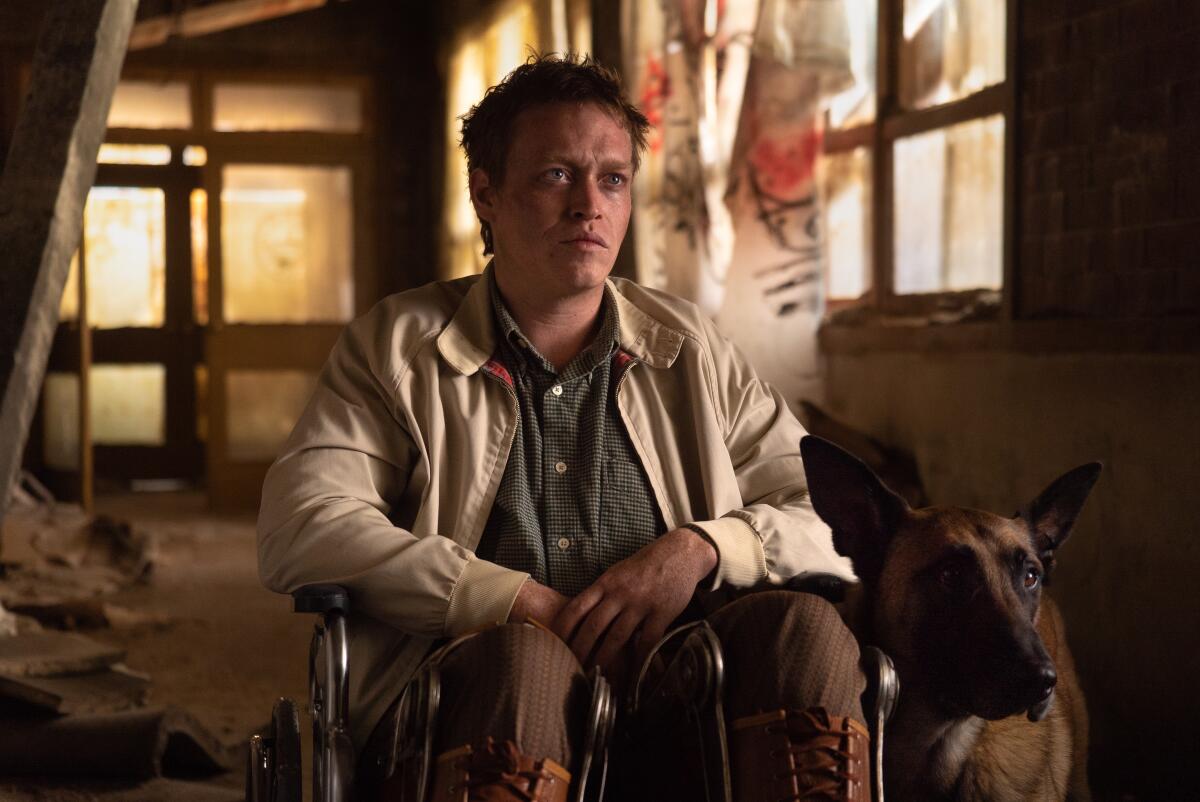Review: Vicious ‘Dogman’ shows a director known for excess at his most unmuzzled

- Share via
At their best, Luc Besson’s films occupy a different plane. His action-thrillers “The Professional” and “Lucy” may be set in our world, but the veteran French director seems to place them in a parallel realm, one powered by the loopy, escapist pleasures of movies themselves. Maybe that’s why, when he has ventured into more overt fantasy terrain like “The Fifth Element,” it has never been a perfect fit. For Besson, the ordinary is suffused with sufficient strangeness.
But none of his previous efforts have exuded such a strong fairy-tale quality as “Dogman,” a strange, sincere paean to a brokenhearted outsider who may also be a sociopath. Part musical, part character study and part crime saga, this fatally uneven drama, about a damaged soul who finds comfort only in his canine companions, brings together Besson’s most extreme tendencies without the inspired feverishness. If not for Caleb Landry Jones in the title role, it wouldn’t work at all.
Jones, who won an acting prize at Cannes in 2021 for portraying a burgeoning killer in “Nitram,” has made a habit of playing fragile men whose inevitable unraveling could lead to terrible violence. He’s ideally suited to the role of Douglas, who, as “Dogman” begins, has just been arrested in drag, decked out as Marilyn Monroe, complete with her pink, strapless gown and ravishing hairdo from “Gentlemen Prefer Blondes.”
The only things that mar his beauty are the bandages and bruises on his face — not to mention the unnerving smile he shoots Evelyn (Jojo T. Gibbs), the psychiatrist assigned to interview him in the middle of the night after Doug was pulled over driving a truck containing dozens of abandoned dogs. Evelyn wants to understand how this perp, who uses a wheelchair, arrived at this moment in his life. Through flashbacks, he will relate his tale of woe.
Ostensibly taking place in New Jersey, the film more accurately resides in a make-believe littered with random pop-culture references and reckless genre transitions. Besson initially appears to be rooted in a grittier register. Lincoln Powell plays Doug in the flashbacks, the most crucial being one in which, as a boy, he angers his volatile father (Clemens Schick), whose unorthodox approach to parenting involves locking his child outdoors in a cage containing several dogs, animals who become his found family. After a grisly altercation with his old man, Doug eventually breaks free — but not before his dad leaves him short a finger and with a crippling spinal injury.
“Dogman” mostly sidesteps the limitations of a familiar narrative approach in which the static present-day story serves as a framework to go back into the character’s past. It helps that Doug’s misadventures, while only sporadically compelling, are suitably odd. Not only does he bond with dogs, apparently he is able to communicate with them, utilizing them as a shockingly (sometimes comically) efficient strike force. Then there’s his unexpected stint as a performer at a drag show, delivering a knockout lip-sync rendition of Édith Piaf’s “La Foule.” Doug will run afoul of gangsters with high-stakes heists, but as is typical of Besson’s solitary protagonists, all he really wants is someone to love.
The film’s saving grace is Jones’ upsettingly gentle portrayal. Whether in the interview scenes or in the flashbacks, his hushed intensity suggests a fractured man-child who was never properly socialized. (His speaking voice barely goes above a whisper.) Even if we’ve come to expect Jones in wounded-animal mode, he remains sickeningly alarming, especially because the actor never lets the audience know definitively if Doug is a victim or a menace.
We’ve mapped out 27 of the best movie theaters in L.A., from the TCL Chinese and the New Beverly to the Alamo Drafthouse and which AMC reigns in Burbank.
That tension proves more gripping than “Dogman” itself. One senses the empathy Besson feels toward Douglas, who is as much of a stray as the homeless dogs he adopts. (It’s hard to forget, too, that this is the director’s first movie since being formally cleared of 2018 rape charges. Intentionally or not, “Dogman” can be read as his defense of a misunderstood innocent.)
But Besson soon finds his way to tonal incoherence: a mishmash of somber character exploration and flagrant clichés. Those missing the shootouts of his “La Femme Nikita” will be happy to know they’ve been awkwardly shoehorned into “Dogman’s” finale, forcing Jones to transform into an unlikely action hero. Besson has rarely seemed so untethered from anything resembling normal human behavior.
Some may relish “Dogman” for that very reason. There’s always been a playful irreverence to his films, an unabashed adoration for B-movie exuberance, his outlandish stories’ faint emotional underpinnings married to giddy spectacle. Jones, never winking at the rampant absurdity, gives the proceedings a little grounding. But Besson wants off the leash and his instincts lead him astray.
'Dogman'
Rating: R, for violent content, language and brief drug use
Running time: 1 hour, 54 minutes
Playing: In limited release
More to Read
Only good movies
Get the Indie Focus newsletter, Mark Olsen's weekly guide to the world of cinema.
You may occasionally receive promotional content from the Los Angeles Times.











